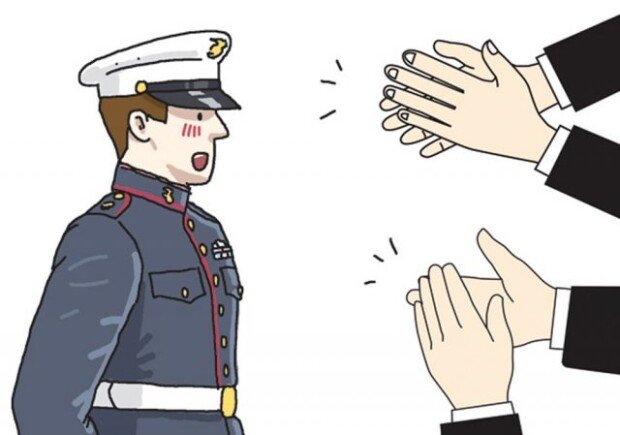Responsibility and sacrifice
Responsibility and sacrifice
Posted December. 14, 2021 08:12,
Updated December. 14, 2021 08:12

When a soldier had dropped by a hamburger store, a citizen paid for his meal. When a soldier boarded a plane to return home, an entrepreneur seated in the business seat section offered his seat. Such stories are published occasionally, showing how respected soldiers are in the U.S., which runs a volunteer military system. All the soldiers in these anecdotes were career soldiers. One may ask if it is necessary to be so thankful, when they are simply doing what they are paid to do? One may say, of course. They should be thankful as they benefit from soldiers serving their country.
Let’s say that such perspectives and thinking are correct. Under the same logic, aren’t office workers, lawyers, computer programmers, plumbers contributing to their nation? How should we view citizens not being appreciative of their work?
Soldiers are special occupations in that they must risk their lives to fulfill their duties and obligations. Perhaps some may raise another point to say that there are many other occupations that risk life. Or maybe every job does. However, soldiers, fire fighters, rescue workers and police officers are special in that they require life sacrifice to fulfill their career responsibilities and duties.
The epitaph in Thermopylae, which honors the 300 Spartan soldiers that fought against Persian soldiers and annihilated, does not read that the soldiers had been brave and courageous in their battle. Instead, it reads “Here obedient to their laws we lie,” It still resonates with people today.
Today, many in our society demand others to take responsibility, while refusing to make their own sacrifices. They are indifferent to the pain and efforts it takes to be responsible while having no tolerance for their own pains. Eventually this leads to more people that feel they are victimized. Instead of convincing them to see the truth, people provoke more anger as if rage is the only way to deal with the situation. My message to them would be: I don’t expect you to risk your life to take responsibility, please at least try to seek your conscience if you still have one.







